How Is Ignoring MCC Objectives A Big Mistake?

Many aspiring doctors, both international medical graduates and Canadian medical students have the goal of obtaining a license to practice medicine in Canada. To make this happen they must Proper coverage of MCC objectives. So they successfully pass the Medical Council of Canada Qualifying Examination (MCCQE) Part 1. While a majority of candidates are able to clear this exam there are some who face challenges that greatly impact their lives. As a result they may start considering career paths, outside the field of medicine in Canada.
A common question that arises is why certain candidates encounter difficulties when taking their qualification exams. Specifically what is the main reason behind their failures? The answer might lie in effectively incorporating the objectives set forth by the Medical Council of Canada (MCC). However does integrating these MCC objectives into ones study plan lead to different outcomes?
This article aims to shed light on the importance of MCCQE1 objectives. Why disregarding them can be a mistake. It will provide answers to all the questions mentioned earlier while also offering tips on how to incorporate these objectives into your study plan. Lastly it will introduce a resource that has been carefully designed to align with these objectives. This resource guarantees improvements in your preparation, for the MCCQE1 exam.
What is the MCCQE1?
Now let me explain what exactly I meant by “MCCQE1.”The MCCQE1 is a test that every medical graduate aspiring to become a doctor, in Canada must pass. If your goal is to join a medical residency program this examination serves as your gateway. Consider it as an opportunity to showcase your preparedness for the world of medicine.
The qualifying examination acts as a milestone distinguishing those who excel from those who’re average. Success requires unwavering determination and commitment. It’s crucial to understand the importance of meeting this requirement. It’s not optional. Medical graduates seeking to work in the healthcare sector must fulfill this criterion.
The exam adheres to the objectives outlined by the MCC. Aligns with the roles described in the Canadian Medical Education Directions for Specialists (CanMEDS). Its structure aims to assess a candidates knowledge and their ability to make clinical decisions.
Administered at the end of school this exam serves as a standard across all medical schools in Canada. It is available four times a year giving candidates options for taking it either at a test center or, with proctoring. Spots are allocated on a come served basis.
However International Medical Graduates (IMGs) have the flexibility to choose any center, in Canada for their exam. This allows them to select a location that’s most convenient for them whether it be in their home country or in Canada.
Additionally IMGs have the advantage of scheduling their exam at a time that matches their preparation and readiness. To apply for the exam you can utilize your physiciansapply.ca account. Have two options for taking the exam. You can choose a Prometric test centre, or you can opt for remote proctoring.
Candidates who pass the MCCQE Part I become eligible for the Licentiate of the Medical Council of Canada (LMCC). This is a crucial step for those who want to get a medical license. It applies to every province and territory in Canada.

What is the format of the MCCQE1 Exam?
This exam is taken on a computer. The MCCQE1 exam format is unique in that it is divided into two parts. One part tests your medical knowledge. The other part checks your ability to make clinical decisions. It is design aims to make sure candidates are ready for supervised practice. They must meet the national standards established by the MCC.
The first part comprises 210 multiple-choice questions that test your medical knowledge. The questions are designed based on the MCC objectives and in accordance with the CanMEDS framework. These questions are challenging and require a deep understanding of various medical concepts.
The second part is called the Clinical Decision Making (CDM) part. It consists of 38 clinical cases. These cases test your critical thinking and ability to make clinical decisions. Clinical cases are also similarly designed based on the objectives. These cases are carefully crafted to replicate genuine situations that you may come across during your medical practice. You need to carefully review the clinical case information. Next, identify the patient’s condition by making a diagnosis. Then, suggest appropriate treatments for that condition.

The exam is very important for those who want to become physician in Canada. The test measures the doctors’ medical knowledge. It assesses their skills in interacting with patients. It also evaluates their competency in different areas of medicine. Candidates who pass this exam show they are ready for supervised practice. They prove they can meet the national standards set by the MCC.
Therefore it is crucial for aspiring candidates to invest time and energy into preparing themselves. This will ensure that they perform well in this evaluation giving their absolute best.

What are the MCC objectives?
In a nutshell, the MCC objectives list key medical concepts. These concepts align with the CanMEDS roles. MCC regularly updates and maintains these objectives. They are accessible to candidates who are preparing for the Canadian qualifying examinations.
Medical graduates preparing for the MCCQE1 exam should view the list of objectives as more than a simple checklist. They should understand that each item on the list is important. It’s not just about ticking off tasks. Instead, these objectives should act as a guide. They should help in developing a full understanding of key medical concepts.
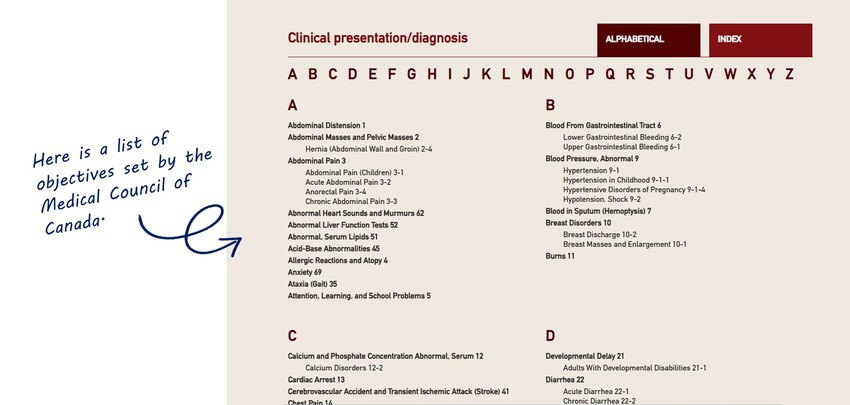
The MCCQE1 exam questions and clinical cases are based on the objectives provided. These objectives guide what candidates will face on the exam. Thus, medical graduates must focus carefully on their learning objectives. They need to fully understand each one.
Properly covering and mastering these objectives will boost confidence. Candidates will approach the exam with confidence, knowing they have covered all the necessary medical concepts required to succeed. With a deeper understanding, they can do more than just answer questions correctly. They can use their knowledge in real-life situations, make appropriate decisions.
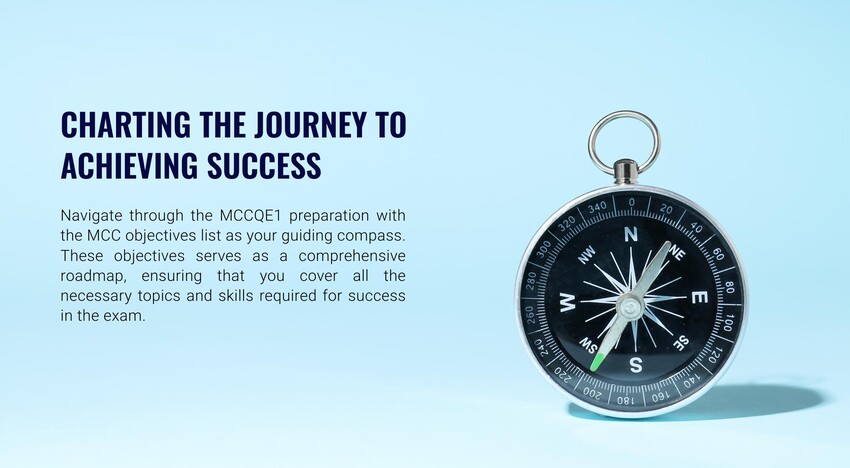
In terms doctors use these objectives to guide them in understanding medical concepts. The great thing is that all these guidelines and resources are available to the public. To find the list of objectives you just need to visit the website of the Medical Council of Canada. If you’re unsure about the URL follow these instructions to locate the list;
- Step 1; Open any web browser
- Step 2; Type “MCC objectives” into the search engine and hit enter.
- Step 3; Look for a result displaying “Medical Expert” under the Medical Council of Canada.
- Step 4; Click on “Medical Expert” to be directed to the MCC website page.
- Step 5; there scroll down a bit.
- Step 6; Find the section called ” presentation/diagnosis.”
- Step 7; Click on the presentation to access the objective.
In a society, with cultures ensuring safety and satisfaction is crucial. A clear framework is needed to address the needs and backgrounds of individuals seeking care.
Recognizing the importance of this matter the Medical Council of Canada (MCC) has put in effort to ensure safety. One crucial area that the MCC focuses on is an understanding of concepts. The Council sets guidelines and expectations, for doctors practicing in Canada ensuring that healthcare professionals possess the knowledge and skills. This is done to provide top quality care ensuring diagnoses, appropriate treatments and informed healthcare decisions for patients.
Ethics and professionalism are also pillars within the MCCs framework (known as CanMEDS). Physicians are expected to uphold standards to maintain patient trust and confidentiality. The MCC enforces guidelines that prioritize well being and interests in healthcare, which fosters trust among patients when seeking medical care confidently without concerns about privacy or misconduct.
The primary objective of the MCC is to uphold training excellence. They establish collaborations with institutions valuing education and assessment while closely working with regulatory bodies across provinces and territories. This partnership helps maintain standards and processes ultimately aiming to enhance the quality of healthcare services provided.
Notably one aspect worth mentioning regarding the objectives set by the MCC is their commitment, to updates.
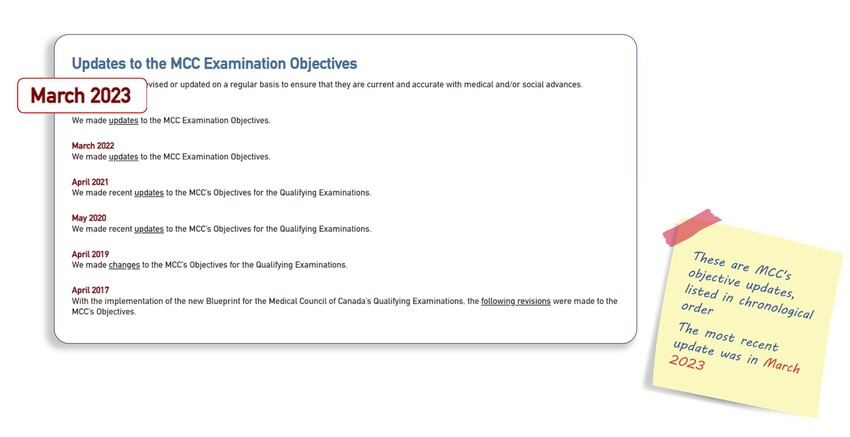
Recent changes and updates are promptly shared on the website. As of March 2023 the MCC has made updates to its Examination Objectives demonstrating a commitment, to equitable healthcare.
The MCC has introduced two areas; “Providing Inclusive Healthcare” and “Enhancing Quality and Safety for Patients.” At the time the focus on “Healthcare for Specific Populations” has been removed. It appears that this topic is now included within a context in the updated objectives. Here are the latest updates:
MCC Objectives – 2023 Update | |
Objectives | status |
Quality improvement and patient safety | Added |
Providing anti-oppressive healthcare | Added |
Health of special populations | Removed |
Providing Inclusive Healthcare – Moving Towards Equality and Embracing Diversity
A significant addition is the objective of providing healthcare. This concept stems from recognizing the pressing need to address health and disparities associated with forms of oppression. The aim is to ensure that healthcare professionals are knowledgeable, about these issues and actively work towards resolving them.
Key Summary Points:
- Anti-oppressive health care combats oppression in all forms, including colonialism, racism, sexism, and more.
- The goals are to provide care that includes everyone. This means thinking about our own biases. We want to support care that affirms a person’s gender. Also, we aim to look at health factors from a societal perspective.
- The approach is proactive and responsive, aiming to dismantle social inequities and power imbalances that affect community health.
- It aligns with the Truth and Reconciliation Commission of Canada’s calls to action.
Quality Improvement and Patient Safety – Enhancing Healthcare Delivery
Adding “Quality Improvement and Patient Safety” to objectives highlights a dedication to effective and safe patient care. It acknowledges that patients can be harmed in healthcare settings. It also highlights the need to learn from such incidents to stop them from happening again.
Key Summary Points:
- Healthcare providers operate in a system that must prioritize improving care quality and safety.
- Harm to patients can occur, leading to a dual impact where healthcare providers may also experience psychological distress.
- Foundational concepts for this objective include harm avoidance, continuous system improvement, and effective responses to when harm does occur.
The updates made by the MCC in March 2023 aim to promote inclusive healthcare, in Canada while also addressing oppression. Their focus on enhancing care through quality improvement and ensuring safety is crucial for advancing the healthcare profession and optimizing patient outcomes.
For those preparing for the MCCQE1 exam it is important to incorporate these objectives into their study plans. Candidates should prioritize areas. Utilize study materials that cover these topics. This step is vital not for passing the exam but for their future medical careers.
The Council works collaboratively with educational programs to align teaching methods with licensing requirements. Additionally they conduct research to improve the evaluation process of physicians paying attention to emerging challenges and knowledge gaps.
Why Should I Incorporate MCC Objectives in My Study Plan?
Incorporating MCC objectives into your study plan is a strategy for achieving success in the MCCQE1 exam. These objectives hold significance not because they shape education in Canada but also because they ensure that future healthcare professionals possess necessary knowledge while providing fair and consistent evaluations for all candidates.
Moreover including these objectives, in your study plan will help you gain an understanding of what to expect allowing you to be better prepared for the exam.
These objectives are also used to evaluate and ensure that all applicants are assessed in an consistent manner. A crucial part is the focus, on skills, such as thinking, effective communication, professionalism and ethical decision making. These competencies not play a role in the examination process but are also fundamental to practicing medicine. This is why the integration of CanMEDS roles is important – it helps candidates prepare for an approach to delivering healthcare within the healthcare system.
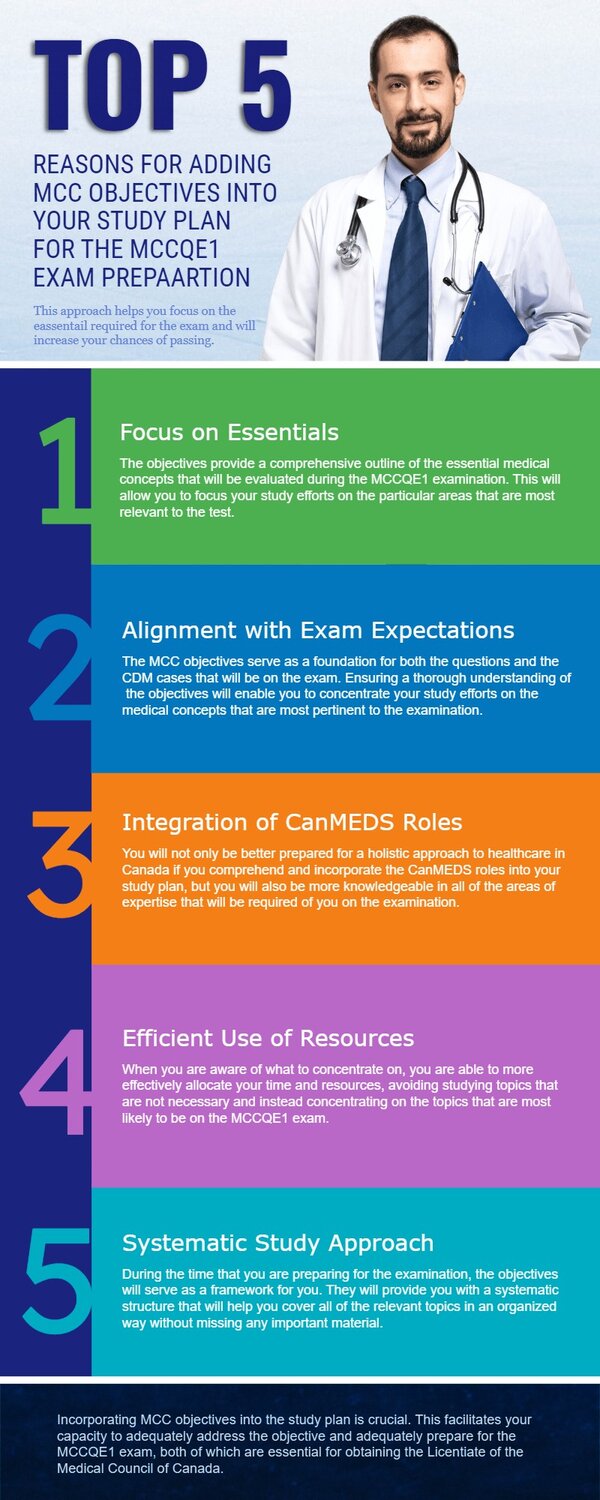
Essentially these objectives serve as a guide for candidates. Assist them in their preparation for qualifying exams. They aid candidates in organizing and prioritizing their study efforts by highlighting concepts that’re relevant, for effective preparation. Here are some genuine reasons why incorporating these objectives into your study plan is beneficial;
First reason:
The objectives are closely aligned with the current standards and expectations of the MCCQE1. By following these guidelines you can ensure that your preparation aligns with the requirements of the exam. Meaning you will focus your study efforts on meeting the medical licensing authorities’ requirements. You’ll ensure that you cover all important topics in detail.
Second reason:
Having a defined set of objectives allows you to determine the importance of your studies. Help you concentrate on the crucial concepts that are likely to be assessed. This way, you can avoid spending time on non-essential material, resulting in a more streamlined and effective preparation process.
Third reason:
Objectives are regularly updated and include the latest medical practices and standards. This means you won’t miss out on the new objectives. It ensures medical graduates prepare adequately. They will meet certain standards and requirements, and preparation helps them to do so.
Fourth reason:
The objectives offer a structured approach to your studies, which helps to systematically cover all necessary topics. This systematic approach reduces the risk of missing critical information. The information that could be vital for the exam and minimizes the risk of gaps in knowledge.
Last but not least:
Finally, by following these objectives, you enhance your overall preparedness. Not only for the MCCQE1 but also for your medical career in Canada. The objectives serve to ensure that you are ready to provide top-quality healthcare upon entering the professional field.
These factors collectively maximize your chances of success on the exam. Set a clear pathway toward achieving your goal of becoming a licensed medical practitioner. While establishing a strong foundation for your future practice.

What Is a Big Mistake to Avoid When Preparing for MCCQE1?
A big mistake to avoid when preparing for the MCCQE1 is neglecting the objectives. The objectives set by the Medical Council of Canada are crucial to develop a clear and cohesive study strategy. Strategy that ensures a comprehensive understanding and proficiency in the essential medical concepts required for the exam.
However, asking this question always yields a diverse answer among medical graduates. Some believe solely relying on textbooks and study materials without practicing with sample questions which is a big mistake. While others firmly believe relying on memorization without understanding the underlying concepts is a big mistake.
The MCCQE1 exam tests for important abilities. It looks for critical thinking, problem-solving, and decision-making skills. Indeed, these mistakes on this exam are viewed as missteps because they show a lack in these areas. Simply studying from textbooks or memorizing facts will not be enough to prepare for the exam. You need to practice with questions and understand the concepts.
Therefore, recognizing the significance of the objectives should be a top priority when preparing for the MCCQE1. It is vital to develop a clear and cohesive study strategy that aligns with these objectives. This ensure a comprehensive understanding of the essential medical concepts required for the exam.
In essence, is best to follow the Council’s objectives to prepare for the MCCQE1. Make a study plan that matches these objectives. It helps you show what you know in essential medical areas on the test.
What is the Best Way to Prepare for the MCCQE part 1?
The best way is to incorporate objectives into your study plan and thoroughly review them. This approach offers two important advantages:
- Identifying areas requiring extra focus:
It is common to encounter certain disciplines that may be more difficult or less interesting than others. So, recognize these disciplines and strategically incorporating them into your comprehensive study plan. This will establish a significant advantage in your exam preparation.
- Developing a practical study plan:
This means creating a plan that is not only comprehensive but also manageable. It is important to design a study plan that you can easily adhere to. The plan that allow you to effectively cover all the essential objectives without overwhelming yourself.
This approach will dramatically increase your chances of success on the exam. Not to mention you familiarize yourself with the format and types of questions. Thus boosting your confidence and reducing test anxiety.
It also recognizes the significance of time management, emphasizing the need to allocate your study time effectively and efficiently. However, you can practice questions in two study modes: time mode or tutor mode. Both methods improve your memory and understanding of the topic. They help you cover the objectives properly. It also minimize the risk of overlooking important information.
Subsequently, to optimize your preparation. It is highly recommended to integrate consistent practice using a question bank into your study regimen. This methodical approach serves dual purposes. It provides a mechanism for gauging your learning progression and illuminates specific concepts that may require additional attention.
On the other hand, regularly practicing exam questions is a key part of getting ready for tests. It’s not just about making sure you understand the content. It’s also about getting to know the structure of the exam. You need to become familiar with the way questions are asked. When you practice a lot, you start feeling comfortable and confident. No matter what tricky things the exam throws at you. This smart preparation strategy lets you go into the exam with confidence. Knowing you have the knowledge to handle any challenges that might come up.
This brings us to the following important point. Having a good study plan that includes the MCC objectives is crucial. Without it, your efforts might be ineffective. It’s like an unprepared traveller trying to cross a huge desert.
Overall, to best prepare for MCCQE Part 1, a candidate should:
- Start with an in-depth review of the MCC objectives.
- Break down the study content into focused, manageable segments.
- Assign specific time allocations to each study segment.
- Regularly integrate practice questions into the study routine.
- Continuously evaluate progress and adjust the study plan accordingly.
Basically, by diligently embedding these objectives into a well-structured and comprehensive study plan. You effectively furnish yourself with the essential knowledge requisite for successfully passing the exam. Much as a desert traveller relies on a carefully charted course and sufficient sustenance to reach their intended destination.

Why Should IMG Know About the MCC Objectives?
The objectives outlined by the Council play a crucial role in obtaining a license. To effectively prepare for the exam it is absolutely essential to comprehend and cover these objectives in your study materials.
The MCCQE Part 1 exam is renowned for its nature. However having a grasp of the objectives significantly increases one’s chances of success. Thus giving priority to understanding and thoroughly addressing these objectives is key to tackling this exam.
Regardless of who’s getting ready for the exam it is advisable for all candidates to align their study materials with the MCCQE1 objectives. This approach ensures coverage of all required areas.
On the hand Canadian medical school graduates are well acquainted with these objectives. They focus on them throughout their education at colleges, universities and residency programs. The CanMEDS frameworks play a role in their training.
This organized approach serves as a guide, for graduates as they prepare extensively for their exams. It guarantees that these future healthcare professionals acquire the knowledge and seamlessly integrate into Canada’s medical workforce.
Think of it as a purposeful journey, where each milestone represents an aspect of proficiency carefully cultivated to contribute to holistic care for the Canadian population.
The objectives serve as stones guiding graduates, towards a path that leads them from school to becoming active contributors in Canadian healthcare system. It’s not about reaching the destination; preparation is crucial. Every graduate needs to be well prepared for their career and seamlessly integrate into the healthcare delivery system.

However for graduates (IMGs) who are outside of Canada these objectives may appear unclear or unknown putting them at a significant disadvantage. As an IMG understanding the MCC objectives is vital for three reasons:
- Alignment with Standards:
These objectives will help you align your studies with the expectations of practice in Canada ensuring an integration into the countrys healthcare workforce.
- Licensing Preparation:
They will assist you in navigating through the licensing process. Adequately preparing for qualifying examinations minimizing setbacks and increasing your chances of obtaining a license
- Professional Growth:
The objectives will also help you identify areas that require improvement in order to meet medical practice standards and foster professional growth.
When preparing for the MCCQE1 exam it is essential to have an understanding of what the MCC expects you to know. They have established objectives and topics that will be tested during the exam. By understanding these objectives and incorporating them into your journey as a graduate you can enhance your chances of success.
Familiarizing yourself with these objectives is akin, to having a roadmap that guides your studying and comprehension. Without knowing the exam objectives it’s like getting ready for a test without any knowledge of what questions will be asked. This uncertainty can make preparation challenging and hinder your ability to showcase your knowledge effectively. It becomes an obstacle that increases the likelihood of failure.

Physician is a symbol of perfection. Perfect balance between knowledge and clinical skills. Imagine being in an emergency room where every second counts towards saving lives or being, in an operating room where quick decision making’s paramount. Even in a family doctor’s office timely diagnosis plays a role. Therefore, failing the board exam can be particularly distressing for doctors in light of the failed pursuit of perfection.
Hence when doctors fail their board exam. It can greatly impact their confidence levels especially when they struggle to understand why they faced difficulties passing the qualifying examination. This situation may lead to feelings of being trapped and frustrated.
As a result the process of obtaining a license can be incredibly challenging and intimidating. That’s why it is crucial to grasp the objectives. It’s not, about studying; it’s about comprehending the areas that the exam seeks to assess. The objectives serve as a roadmap outlining the terrain of the examination landscape. Without this guidance doctors preparing for these exams may feel like they are embarking on a journey filled with obstacles and setbacks.
Some individuals argue that understanding the objectives of an exam holds significance. They believe that medical graduates can rely on their existing knowledge and experience. However comprehending these objectives is akin, to having a roadmap. It assists doctors in prioritizing the areas of study.
The field of medicine is broad encompassing branches and specializations that cater to diverse aspects of healthcare. Within this domain we have primary care physicians who offer services as well as specialized surgeons who perform intricate procedures. Each healthcare professional plays a role in ensuring the well being of patients.
One particular branch of medicine is internal medicine, which concentrates on preventing, diagnosing and treating diseases that impact adults. Internists. Also known as internal medicine physicians. Undergo training to manage conditions like diabetes, hypertension and heart disease. They serve as caregivers for adults. Excel in coordinating care across specialties.
Pediatrics represents another area that focuses on providing healthcare services for infants, children and adolescents. Pediatricians are dedicated to promoting the health and well being of their patients through check ups, immunizations and treatments for common childhood illnesses. Additionally they play a role, in monitoring growth and development while addressing any concerns or conditions that may arise during these stages of life.
Surgery plays a role, in the field of medicine as it involves life saving procedures. Surgeons possess the skills and expertise to perform surgeries like removing tumors repairing injuries or conducting organ transplants. They collaborate closely with anesthetists, nurses and other healthcare professionals to ensure the safety and success of each procedure.
Other areas of medicine include obstetrics and gynecology which focuses on womens health and psychiatry which deals with health. Each specialty requires training and expertise to provide care for patients.
Apart from these fields medicine encompasses aspects such as research, public health initiatives and preventive medicine. Overall medicine is a field that combines knowledge, technical skills and empathy to improve the well being of individuals and communities. With advancements in technology and ongoing research endeavors this field continues to evolve by offering approaches for diagnosis, treatment options and preventive measures.
Top Reasons to Understand MCC Objectives | |
Adhering to Canadian Standards | The objectives established by the MCC are, in line with the accepted standards in Canada ensuring the safety and well being of patients. It is vital for healthcare professionals to be familiar with and uphold these objectives as part of their dedication to maintaining a practice. |
Continuous Professional Growth | By acquainting themselves with the MCC objectives IMGs can identify areas where they can enhance their knowledge and skills. This understanding plays a role in their growth helping them improve and excel in their careers within Canada. |
Preparation for Qualifying Examinations | IMGs must have a grasp of the MCC objectives to effectively prepare for qualifying examinations like the MCCQE1 and OSCE. These exams are designed based on these objectives making it essential for IMGs to align their preparation accordingly. |
Alignment with the Canadian Healthcare System | The MCC objectives align with the competencies required for integration into the healthcare system in Canada. Understanding these objectives is crucial, for IMGs as it facilitates their assimilation into the workforce. |
Therefore it is crucial to have a guide that helps medical graduates focus their studies on topics for exams. By knowing the objectives beforehand candidates can avoid wasting time on content that may not be tested. This ensures preparation leading to higher scores. Understanding the objectives is like having a difference between feeling lost and confused versus feeling confident, about how to proceed.
There are resources, at your disposal to assist you in comprehending the objectives of the qualifying exams and preparing efficiently. One valuable resource is the MCC website, where you can find an overview of the exams content and objectives.
Another effective approach is to join study groups or seek guidance from individuals who have triumphed in their exams. These strategies can greatly enhance your understanding of the objectives. Help you prioritize your studying.
Considering the challenging requirements of the exam and the limited number of allowed attempts for MCCQE Part 1, let’s imagine a situation where an International Medical Graduate doesn’t succeed in passing within the given attempts. As a result, they would no longer be eligible to obtain a medical license. However, having a thorough understanding of the objectives at hand would undeniably enhance their likelihood of achieving success.

What Does Ace QBank Have to Do with MCC Objectives?
Ace QBank stands as a pivotal resource for physicians preparing for the MCCQE Part 1 exam. Which is an important step in getting certified in Canada.
At its core, Ace QBank is aligned with the objectives set by the Medical Council of Canada. Embodying a comprehensive suite of tools that mirror the scope of these objectives.
Each element within the Qbank is crafted to dovetail seamlessly with the MCC’s outlined objectives. Ensuring that physicians engage with material that is not only relevant. But also essential for mastery of the competencies expected of a practicing professional. The question bank is an extensive compilation that traverses all necessary disciplines. While the CDM cases presented are reflective of real-world scenarios that a Canadian physician must adeptly navigate.

Ace QBank is committed to maintaining its excellence by evolving its content. Regular updates are made to incorporate the up to date objectives ensuring that the platform remains at the forefront of education in the field. This approach allows physicians to stay well prepared and aligned with the nature of the industry as envisioned by the MCC.
Furthermore the MCCQE1 self-assessment of Ace QBank acts as a tool for users. It reflects their knowledge and highlights areas that require attention. Keeping track of objectives can be challenging. This assessment addresses that by providing references to objectives within each question. This enables users to identify what they need to study and effectively prepare for their exams.
It is crucial to emphasize the importance of this kind of preparation for the MCCQE1 exam. The exam goes beyond testing knowledge; it aims to evaluate an understanding and instinctive grasp of medical concepts and patient care.

The alignment, between Ace QBank and MCC objectives is not accidental; it is deliberate and absolute. It serves as a platform through which physicians can focus their study efforts efficiently optimizing their time while covering all MCC objectives.
This experience also helps candidates get closer, to passing the MCCQE Part 1 exam. One of the strengths of Ace QBank is its comprehensive collection of high-yield questions that cover various topics related to MCCQE1. These topics encompass medicine, surgery, pediatrics, obstetrics, psychiatry and more.
The questions in Ace QBank are meticulously crafted to match the difficulty level of the exam. They effectively evaluate your knowledge of the exam objectives while also familiarizing you with the format of the test. However what truly sets Ace QBank apart is its quality explanations. The question bank incorporates evidence based medicine explanations that ensure accuracy and reliability. It also ensures that the content aligns with the research and MCC objectives.
Lets not overlook the thought provoking CDM cases designed to test your problem solving skills and decision making abilities. These materials concentrate on critical topics with a focus on efficient learning.
Each clinical case in Ace QBank is accompanied by a set of questions and comprehensive explanations presented concisely. This approach ensures that learners receive information without feeling overwhelmed ultimately aiding in preparation, for the CDM section of the exam.
The primary objective of the Qbank is to offer graduates and students a top-notch resource. Its purpose is to assist them in preparing for their exams. The content of the Qbank is specifically designed to align with the objectives established by the MCC ensuring that it provides high yield information.
To enhance comprehension the Qbank incorporates an array of aids, including flowcharts, summary tables and custom illustrations. These visual tools are implemented to simplify subjects and make them more accessible, for understanding.
On the other hand, it enhances the recall of essential information. This will boost the performance of the candidate on exam day. Providing information in an engaging, visually appealing way makes learning enjoyable. It helps users recall information more easily.
In addition to its large collection of high-yield questions. It also provides self-assessments for MCCQE1. These assessments mimic the real exam experience. These assessments play a crucial role in gauging one’s readiness for the exam.
Ace QBank offers self-assessments that mirror the MCCQE1 exam. They have the same format. This gives users a practice experience that feels like a real test. The simulations are timed to match the real exam’s time limits. Users can test their readiness and spot areas they need to work on.
These assessments are valuable because they have unique, carefully selected questions. These questions are not the same as those in the main MCCQE1 Qbank. This ensures the evaluation is accurate.
The self-assessments also give feedback and explanations for each question. This lets users learn from their mistakes. It helps them improve their exam preparation.
In essence, Ace QBank is meticulously designed to match the MCCQE Part 1 exam. It fully covers the MCC’s objectives in its content. The question bank is lively and current. It includes clinical cases that are crucial for learning the skills Canadian physicians need. Regular content updates keep the material in line with the latest medical practices. This focused and effective tool helps improve exam preparation.
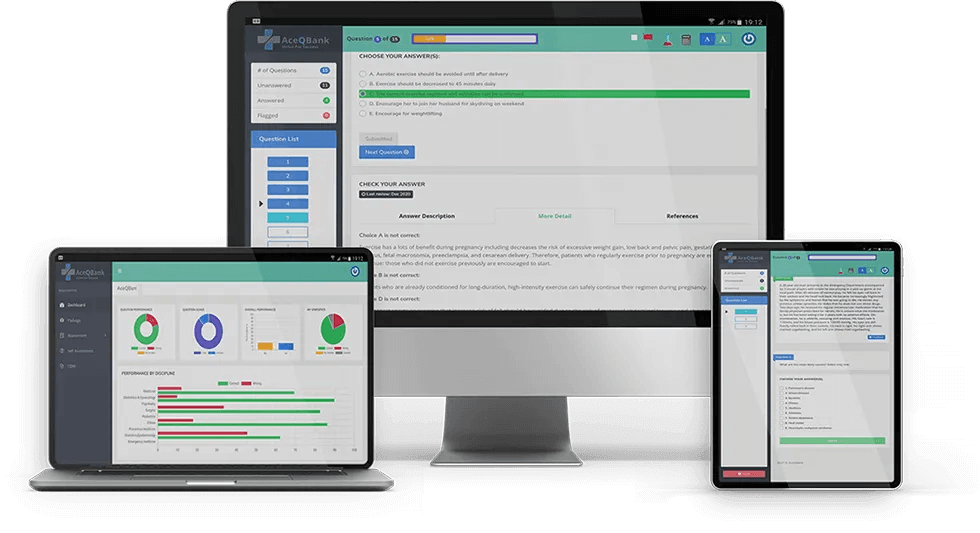
How Can Ace QBank Help You in MCCQE1 Exam Preparation?
One of the best ways to tackle the objectives set by MCC is through active learning. This means you should actively engage with the objectives. Look for areas that need more attention. Point out any concepts that you might not understand.
It is crucial to go above and beyond mere knowledge acquisition and challenge yourself to expand your learning. Dedicate sufficient time to thoroughly explore each discipline and ensure a comprehensive understanding.
This is where Ace QBank comes into the picture. The question bank not only facilitates the preparation for the exam but also helps you master the essential objectives. The alignment of the Question bank with the MCC objectives is a strategic decision. It ensures that your study time is used effectively. Every minute you spend studying counts.
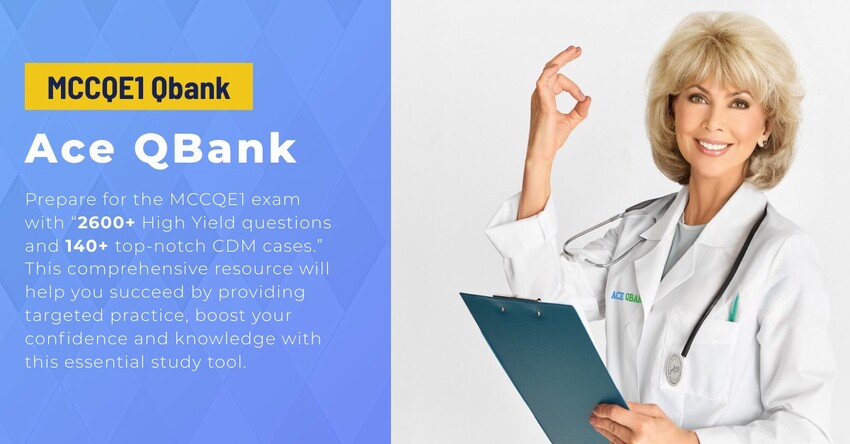
The question bank is thorough. It is also targeted. It reflects the format and content of the actual exam. It creates a simulation environment where you can apply your medical knowledge. It helps you sharpen your ability to think critically and make medical decisions.
Moreover, the self-assessment let you track your progress. They help you spot your weak areas. This way, you can concentrate your studies on the parts that need the most improvement. The content is updated regularly to match the latest updates. This offers a review experience that is current and ensures you learn the latest care standards.
This is how Ace Qbank helps you prepare for the MCCQE1 exam. The Qbank has a large collection of high-yield questions designed for the MCCQE1. This ensures it is an unmatched place for improving your knowledge and test-taking skills. It helps you succeed on this important exam.

Key Takeaways
When preparing for the MCCQE1 exam it’s crucial to prioritize understanding the objectives set by the MCC. Developing a study strategy that aligns with these objectives is essential, for preparation and proficiency in the medical concepts required for the exam.
Neglecting these objectives would be a mistake as they have been carefully crafted to encompass the knowledge expected from graduates. Additionally these objectives play a role in guiding your preparation process from creating a study plan to highlighting the essential areas you need to focus on for success on the exam.
For physicians getting ready, for the MCCQE1 exam Ace QBank is a resource. It has been designed to align with the Medical Council of Canada objectives and offers a range of tools that cover all aspects of these objectives.
The question bank includes high yield questions and notch CDM cases specifically tailored for MCCQE1. It also provides a self assessment feature that simulates the exam experience allowing you to gauge your readiness before taking on the challenge.
Ace QBank has been thoughtfully designed based on these objectives to assist you in preparing for your exam.


